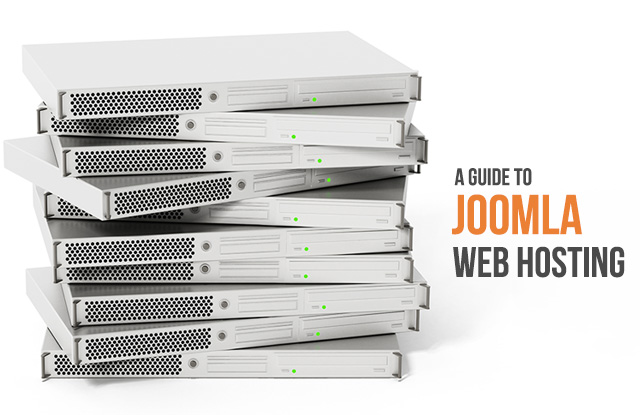5 Best Joomla Web Hosting Providers of 2021
Although Joomla is one of the most popular open source content management systems in use on the web, only a few web hosting companies offer platform-specific tools to optimize Joomla websites. While most Linux and Windows hosting plans support the basic requirements for running Joomla, which are Apache version 2.4 or higher (2.0 minimum), MySQL version 5.5.3 or higher (5.1 minimum), and PHP version 5.6 or 7.0 (5.3.10 minimum), site owners need to be prepared to dedicate more than the minimum system requirements to the CMS in order to receive the best website performance. For many high traffic Joomla websites, this means upgrading from the limitations of shared hosting to a VPS or dedicated server plan. For small business website owners, a more cost-effective method can be running Joomla on a cloud hosting plan. While the inclusion of a “one click” installation option for Joomla can be helpful in deployment, most Joomla websites will need to be built on premium hardware and implement advanced caching options on web pages in order to scale to higher levels of CMS performance.
This article will review the five best Joomla hosting companies that we have identified for web development on the basis of web server hardware performance, platform features, quality of customer support, included software tools, and the affordability of each plan. Read on to learn more about choosing the best Joomla web hosting provider:
Our Top 5 Favorite Joomla Web Hosting Providers:
| Web host: | Price range: | # of sites: | Panel: | Learn more: |
|---|---|---|---|---|
| InMotion Hosting | $2.95 to $7.49/mo | 2 to Unlimited | cPanel | View Plans |
| HostGator | $4.95 to $9.95/mo | 1 to Unlimited | cPanel | View Plans |
| A2 Hosting | $3.92 to $9.31/mo | 1 to unlimited | cPanel | View Plans |
| Rochen | $4.95 to $8.95/mo | 1 to unlimited | cPanel | View Plans |
| SiteGround | $3.95 to $14.95/mo | 1 to unlimited | cPanel | View Plans |
1. InMotion Hosting – Reliable & Affordable Shared Hosting for Joomla
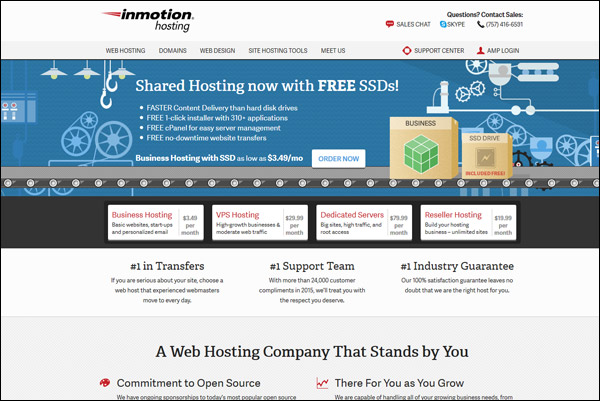
2. HostGator – Hybrid Cloud Web Hosting for Joomla
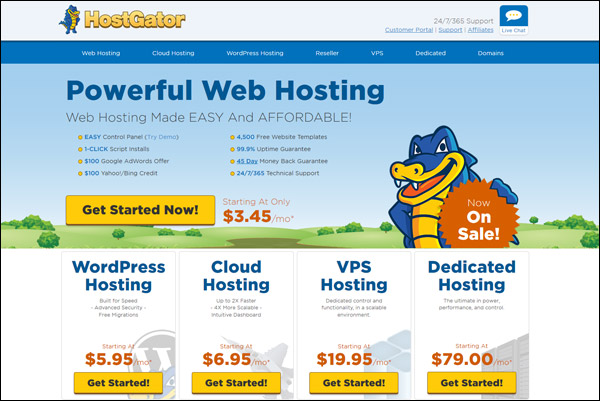
3. A2 Hosting – Managed & A2 Optimized Joomla Hosting Plans
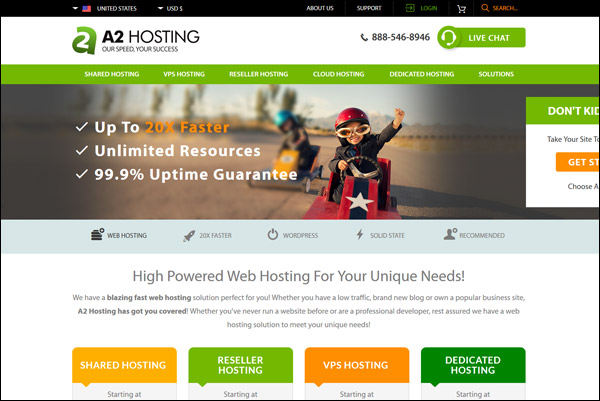
4. Rochen – Powerful Shared Hosting for Joomla Sites
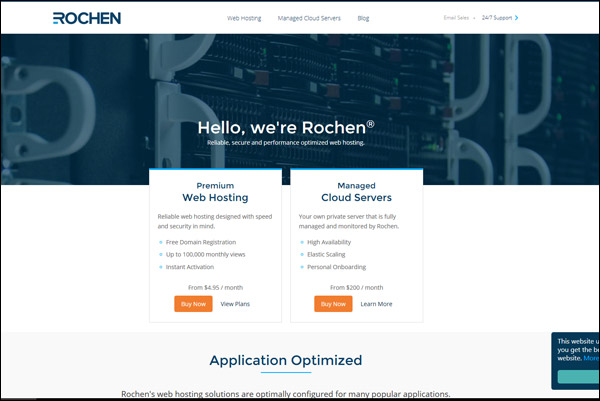
5. SiteGround – Great Shared Web Hosting for Joomla
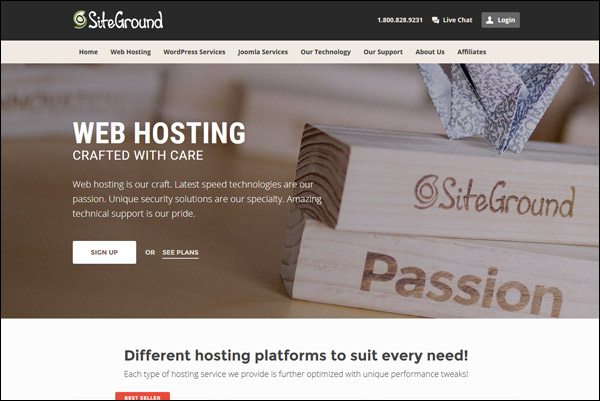
What to Look for When Purchasing Web Hosting for Joomla
Most businesses and independent web publishers start with a Joomla website on a shared hosting plan and then upgrade to a VPS plan if their website traffic scales beyond what the account limits of the initial service will support. Site owners who require the best performance can focus on either providing more hardware resources to the CMS or implementing more software driven page caching layers when publishing to web browsers. Cloud hosting plans with optimized network routing and load balancing can add an additional level of performance gains. APC, OPcache, and Memcache all work through PHP module extensions and can be implemented for most Joomla websites running on shared hosting plans. Nginx, Varnish Cache, and Redis are all more advanced frameworks that require custom server configuration on a VPS or dedicated server. Cloud hosting plans that offer these advanced page caching options as part of a “Platform as a Service” product can save a lot of money for small businesses using Joomla for web publishing over hiring a development team to build-out a custom solution. Any popular website or ecommerce store using Joomla will need to implement multiple caching layers on premium hardware in order to scale to meet the performance requirements of a high level of web traffic.
Many web hosting companies advertise “Joomla Hosting” services but only provide the basic platform support with one-click script installation using Fantastico or Softaculous. Site owners should carefully scrutinize the fine print on a hosting plan and compare add-on features specific to the Joomla CMS when making a decision between companies. SiteGround has one of the best customized server environments for Joomla development, and Rochen also contains a number of advanced tools for the platform. The main difference is SiteGround’s Nginx integration which none of the other web hosts provide. Since the only other option for Nginx integration with Joomla is to contract a VPS or dedicated server plan and install the entire LEMP environment individually, SiteGround’s SuperCache plugin is a unique option that can save small businesses and independent publishers a lot of money vs. the custom development costs required to program the same features for Joomla. In summary, cloud hosting plans provide better performance options for Joomla than shared hosting services, with premium hardware and multiple layers of page caching built into the platforms. Because Joomla is resource intensive, even small websites will appreciate the performance gains available on cloud hosting plans, and Joomla website owners should consider them as a default option over shared hosting unless a specific upgrade to a VPS or dedicated server plan is required due to web traffic or custom development needs.
Some of the most important features to look for when deciding on the purchase of a Joomla web hosting plan are:
- Joomla Web Development Tools – platform-specific developer tools can distinguish expert Joomla web hosts from those that only support the basic installation of the script
- Premium Hardware Configurations – the latest multi-core web servers with solid state drives (SSDs) and ECC DDR4 RAM will provide the best overall CMS & database performance
- Cloud Server Optimization – cloud hosting offers an alternative to VPS plans with the benefits of network load balancing and elastic scaling to web traffic requirements
- Advanced Page Caching Options – a multi-layered caching approach including Nginx, Varnish Cache, APC, OPcache, & Memcached can vastly improve Joomla page load times
- Free Global CDN Integration – the inclusion of a free CDN service like CloudFlare on hosting plans adds value and the ability to deploy cached web page files globally
- Scalable Server Resources – allocating more CPU cores, system RAM, and web server I/O processes to a Joomla installation is one of the best ways to optimize the CMS
- Script Installation Utilities – many Joomla hosting plans offer a pre-installed website, a development subdomain for testing code, & “one click” script installation wizards
- Systems Administration Tools – a combination of cPanel for multi-domain administration and server configuration with SSH, cURL, Git, Subversion, etc. for version control
Most Joomla website owners prefer to run the CMS on a LAMP platform, primarily due to the cost advantages of shared Linux hosting plans. However, there are a lot of differences between the stack software installed on each of the different proprietary web hosting platforms, even when the companies are offering a similar cPanel and CentOS Linux environment. The inclusion of Joomla web development utilities and advanced support for web standards, including the latest versions of programming languages, database frameworks, libraries, and server extensions, can be an important method to distinguish between the quality of hosting services offered by the different companies. This relates also to “Platform as a Service” products such as cloud hosting plans. The inclusion of premium hardware, low density server environments, advanced load balancing on network traffic, and alternative page caching features on cloud hosting plans guarantees that they will provide better performance for Joomla CMS websites over shared hosting servers. When combined with scalable resource allocation that assigns higher levels of dedicated CPU cores and system RAM to an account, cloud hosting platforms offer competitive alternatives to VPS plans, often available at a fraction of the price on a monthly contract. However, most cloud hosting plans except for Rochen & SiteGround (Joomla partner companies) are not specifically optimized for the Joomla CMS and lack the suite of developer utilities found on specialist hosting solutions.
Consequently, Joomla website owners will need to balance the different advantages and disadvantages of each company platform when making a final decision on a web hosting plan. The requirements of production websites can change over time as the number of visitors to a domain presence scales to higher levels through search engine traffic and special sales & marketing promotions on social media. Business site owners and web developers often need to transition from shared hosting to a VPS plan or dedicated server while staying with the same company. Web hosts that provide free website migration services can make it easier to change contracts for existing sites to seek out better deals. Many cloud hosting platforms are new and may not have existed when a Joomla website was originally launched. Transferring to these platforms from a shared hosting account is one of the easiest ways to optimize CMS website performance with minimal additional costs. Even low traffic Joomla websites will see the result of faster page load times through greater levels of premium hardware allocation, advanced page caching, and network load balancing. Cloud hosting plans reflect the latest innovations in web publishing and data center network management. Best practice is to upgrade Joomla websites to a cloud hosting plan for better page load speeds than available on shared hosting, and use VPS accounts when the server environment needs to be customized for specific web development requirements. Elastic cloud platforms based on virtualization can also be used to replace dedicated servers for Joomla websites with the highest levels of web traffic.


